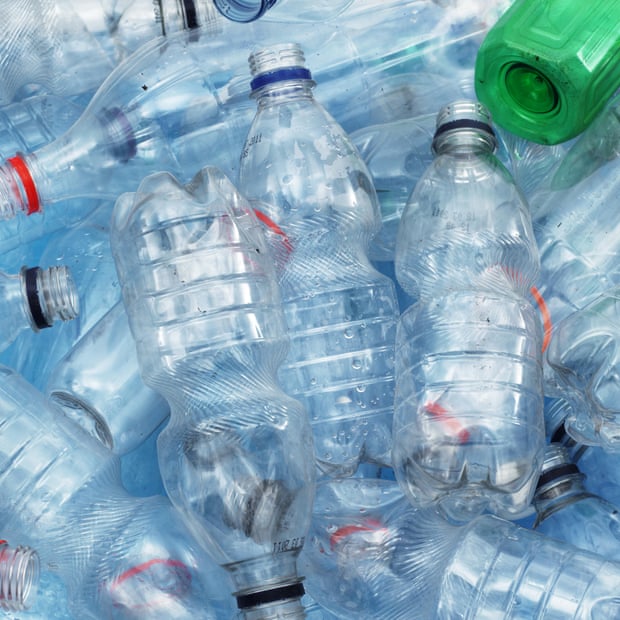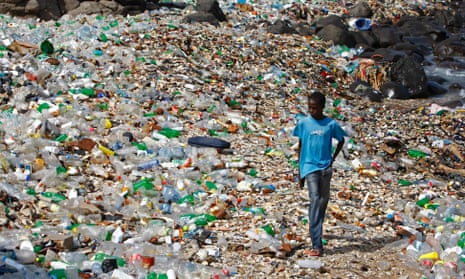New bioplastics are being made in laboratories from straw, wood chips and food waste, with researchers aiming to replace oil as the source of the world’s plastic.
The new approaches include genetically modifying bacteria to eat wood and produce useful chemicals. But the bioplastics are currently significantly more expensive to make than fossil fuel-based plastics.
Land and seas around the world, from high mountains to deep oceans, have become polluted with plastic, prompting major public concern. The world has produced 8bn tonnes of plastic since the 1950s and demand is still rising.
While some waste plastic is recycled, much of it is incinerated to produce electricity, resulting in carbon emissions that drive climate change. In contrast to plastic made from oil, plastics made from plant-based materials only release the carbon the plants absorbed from the air as they grew. Bioplastics will also give more options for products that biodegrade in the environment, although they can be made very long-lasting if required.
“Plastics are an incredible enhancement to our daily lives,” said Paul Mines, CEO of Biome Technologies in the UK, which has spent £5m in the last five years on bioplastics research. Plastic is both light and strong, he said: “But we can’t go on using fossil fuel-based materials. About 6-7% of every barrel of oil is used to make plastics.”
Using plant materials is feasible, said Prof Simon McQueen-Mason, at the University of York. Replacing half of the nation’s plastic bottles could be done using just 3% of the sugar beet crop, 5% of wheat straw or 2.5% of food waste, he said.
“These are the scales we would need to see a large-scale replacement of oil-based plastics,” he said. “It is something that would be practical within the UK, and we’re talking about a very big economic opportunity.” The UK plastic production industry has an annual turnover of £25bn.
Quick GuidePlastics and our throwaway society
Show

Why is plastic being demonised?
Since the 1950s, 8.3bn tonnes of plastic has been produced. Plastic is seen as a versatile, indispensable product, but the environmental impact is becoming more stark. Plastic is now so pervasive that recycling systems cannot keep up and the leakage into the environment is such that by 2050 plastic in the ocean will outweigh fish. In 2017 scientists found plastic fibres in tap water, and plastic has been found in the stomachs of sea creatures in the deepest part of the ocean. Most plastic waste ends up in landfill sites or leaks into the natural environment, where it is causing huge damage to eco-systems on land and sea, creating near permanent contamination. According to academics in the United States, by 2015, of all the plastic waste generated since the 1950s, only 9% has been recycled, with 12% incinerated and 79% accumulated in landfill sites or the environment.
Why are the supermarkets under fire?
Producers of plastic include retailers, drinks companies and supermarkets. Supermarkets create more than half of the plastic waste in the household stream in the UK. But they refuse to reveal how much they put on to the streets and how much they pay towards recycling it. Supermarkets are under pressure to reduce their plastic packaging and campaigners argue they have the power to turn off the tap. Much of the packaging they sell to consumers is not recyclable: plastic film, black plastic trays, sleeves on drinks bottles and some coloured plastic. The Recycling Association and other experts believe supermarkets could do much more to make packaging 100% recyclable and reduce the use of plastic.
Who pays to clean up the waste?
The taxpayer, overwhelmingly. UK producers and retailers pay among the lowest towards recycling and dealing with their waste in Europe. In other countries, the “polluter” is forced to pay much more. In France, a sliding system of charges means those who put more non- recyclable material on the market pay more.
What can shoppers do to help?
Supermarkets are under pressure, not least from the prime minister, to create plastic-free aisles. A growing number of zero-waste shops are springing up and consumers are being encouraged to ask for products to be sold without plastic.
Sandra Laville
Currently, just a few thousand tonnes of bioplastic are used in the UK each year, compared to millions of tonnes of conventional plastic. Mines said this could rise to about 20,000 tonnes in the next five years.
One technology now being scaled up from the lab is using a Rhodococcus bacteria to break down lignin, the very tough material that gives trees and other plants their strength. The bugs naturally eat lignin but Prof Tim Bugg, at the University of Warwick, working with Biome Technologies, has genetically engineered them so they produce useful chemicals for a bioplastic that can be used for bottles.
Lignin was long seen as impossible to break down usefully, but Bugg said: “Ten years on [from when I started], people are now saying it may well be possible.”
Lignin is a major waste product in paper and card manufacturing and is currently burned. “We shouldn’t be burning biomass, because we can make electricity and heat in more sustainable ways,” said McQueen-Mason. “But we don’t have any other source of the complex carbon chemistry we need to make the fuels, plastics and chemicals that currently come from petroleum.”
Prof Janet Scott, at the University of Bath, is tackling the problem of plastic microbeads, which have been banned from facewashes and other products in the UK and elsewhere. “We didn’t just put in microbeads into products for the heck of it,” she said. “You might have bought a skin exfoliant that had microbeads in to make it slightly rough and to make you glow and look gorgeous.”
Scott’s answer is to push dissolved cellulose – another tough plant material – through tiny holes and use chemistry to form the drops into tiny biodegradable beads.
Companies around the globe are working on bioplastics, including major players such as BASF, Novamont and DowDuPont, said Mines: “This is a global movement.”
Using food crops to make biofuels has been controversial as it may cause price rises, and there is wariness about using food to make plastics. But McQueen-Mason said the approach should not be dismissed: “You can produce as much sugar in North Yorkshire per hectare with sugar beet as they produce in São Paulo state in Brazil with sugar cane. Sugar beet is an incredibly effective crop in the UK and farmers love it.”
Some companies are currently using chicory and Jerusalem artichoke to make bioplastics, he said, because these contain fructose, which is closer to the chemicals required than the sucrose found in sugar beet.
Plastic has become ubiquitous not only because it is useful, but also because it is extremely cheap, and this presents the biggest challenge to bioplastics. People will pay a premium for some bioplastic products, such as biodegradable coffee pods that can composted, but Mines said: “I can’t predict if it will ever reach parity.”
